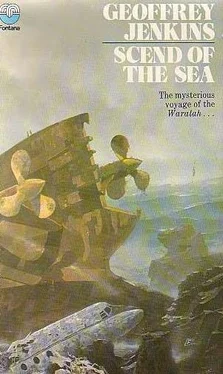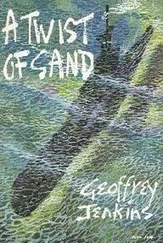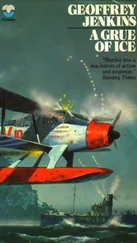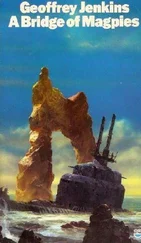Geoffrey Jenkins - Scend of the Sea
Здесь есть возможность читать онлайн «Geoffrey Jenkins - Scend of the Sea» весь текст электронной книги совершенно бесплатно (целиком полную версию без сокращений). В некоторых случаях можно слушать аудио, скачать через торрент в формате fb2 и присутствует краткое содержание. Жанр: Морские приключения, на английском языке. Описание произведения, (предисловие) а так же отзывы посетителей доступны на портале библиотеки ЛибКат.
- Название:Scend of the Sea
- Автор:
- Жанр:
- Год:неизвестен
- ISBN:нет данных
- Рейтинг книги:5 / 5. Голосов: 1
-
Избранное:Добавить в избранное
- Отзывы:
-
Ваша оценка:
- 100
- 1
- 2
- 3
- 4
- 5
Scend of the Sea: краткое содержание, описание и аннотация
Предлагаем к чтению аннотацию, описание, краткое содержание или предисловие (зависит от того, что написал сам автор книги «Scend of the Sea»). Если вы не нашли необходимую информацию о книге — напишите в комментариях, мы постараемся отыскать её.
Scend of the Sea — читать онлайн бесплатно полную книгу (весь текст) целиком
Ниже представлен текст книги, разбитый по страницам. Система сохранения места последней прочитанной страницы, позволяет с удобством читать онлайн бесплатно книгу «Scend of the Sea», без необходимости каждый раз заново искать на чём Вы остановились. Поставьте закладку, и сможете в любой момент перейти на страницу, на которой закончили чтение.
Интервал:
Закладка:
And, as if to reaffirm her faith in her sailor-husband, she never applied to the courts to have him presumed dead, as so many others did. 'Douglas Fairlie wasn't dead when the Waratah went down,' she stated flatly. I used to visit her among the noble oaks of Stellenbosch, where she had a small house in classic Old Dutch style. She had settled in South Africa after the Waratah tragedy. In her will she had left me some priceless Waratah documents.
A few hours before, I had been excited, taut, eager for a voyage which I boasted inwardly to my own scientific ego could be a little Challenger expedition. My route lay first down the coast along the line of the largely unexplored terraces and sea-bed contours of the Agulhas Bank. Then my mission would take on a different form altogether-the study of wind, weather, and the uprising of great bodies of water in the cold seas to the south of Bouvet, towards the ice shelf itself.
Now, what an unknown girl thought, on seeing my cabin, predominated: to her it was beyond ordinary credence that anyone, isolated as I was in the trackless wastes of the South Atlantic, should for his sole relaxation content himself, as I did, with half a dozen books on Antarctic meteorology and the obscure rewards to be won from a wind gauge. It was not enough, she had reasoned. There must be more to me somewhere: she had gone to the photograph of the Waratah and the airliner to find it.
'A ship fine on the starboard bow, sir!'
Smit broke into my thoughts, but the sideburned Fourie, who perhaps sensed my wish to be alone, simply gestured out to starboard and ahead from the dimness of the wheel-house. I saw them too-the lift of the supertanker's masthead lights in the swell. To port, we had picked up Slangkop light — a ship had died here a few days after the Waratah, in the next great gale of the 1909 winter. Perhaps Smit, too, detected my mood, for neither of them spoke. 'Everything well on board' — why did it keep coming back so compulsively since our meeting in the cabin? Those were Waratah's last words to the world!
She held up a mirror to me: I was nearly thirty, but last year, one whole year, had been lost among the great seas of the Southern Ocean. Was she trying to tell me, by calling my cabin a cell, that life was passing me by? Yet life had been good-until the Viscount crash. Now it came to me for the first time that Dad had been barely a year or two older than I when the Second World War had broken out; he had flown with the first war-time squadrons of the South African Air Force against the enemy in Africa. What had he done before that? I simply did not know. Flying had seemed to be his whole life; I had never thought of him as other than a flyer. He had ended the war as a colonel, and it was he who had led the daring bomber raids against the Rumanian oilfields and Warsaw. He was old for a pilot when he died in the Viscount. It was to be one of his last flights before retiring as a civil pilot, which he had become after the war. My mother Anne Fairlie never recovered from the shock of the disaster and died a year later. It meant the end of a gracious home at Rondebosch, not far from the stately Groote Schuur, donated by Cecil Rhodes to be the official residence of prime ministers. My mother was ailing when the inquiry had questioned her about my father's health, and afterwards she never discussed the crash again except, like Granny Fairlie, to assert: 'Bruce Fairlie didn't die at the controls. He was alive after the plane hit the sea.'
Jubela came through to take the wheel and the midnight watch. The Cape Point light (Drake's 'fairest Cape’) stood out clear, but in the rain I could not distinguish the neighbouring twin peaks, Maclear and Vasco da Gama. I kept well clear of the land with soundings going, for the Cape is the graveyard of careless skippers. Eastward bound as we were, Cape Point is the last of the three great lights of the Peninsula; now, in saying goodbye to it, I realized that I was saying goodbye to the person who had stepped so accidentally, yet so forcefully, into my thoughts. Would we-could we-meet again after that first revealing, penetrating encounter? I did not make up my mind, then: Agulhas, Danger Point, Quoin Point all lay ahead in the darkness and the rain, and she was behind now.
Jubela did not give me his usual greeting in Zulu, adding his deferential 'Kosaan — little chief. Instead, he said quietly, 'Umdhlebe.' By that single word it was clear that he had read my preoccupation. With her? — 1 rationalized it, not her, but myself. Jubela was a witchdoctor's son; I never found out what brought him to sea. His home was somewhere in the hot Tongaland sand forest where the Pongola River finds its normal channel too small to flex its flood muscles in and spills into a series of extensive, shallow flood pans. The Downs of Gold, the earliest Portuguese explorers called Jubela's land, looking optimistically at it with eyes seared by the sun of crossing half the world on their way to reach India. With that sixth sense the witchdoctor or sangoma inherits psychological insight, one could call it — Jubela called me by the strange name he reserved for rare occasions.
Perhaps seven or eight months before, the weather ship had been taking it green as she plugged her way into the teeth of a gale far to the south of the Cape. The seas had been breaking heavily and lifelines were rigged. Jubela had been at the wheel, but I was anxious for the safety of our precious scientific apparatus, and I sent him aft to check whether our makeshift balloon-filling hut was standing up to the seas breaking aboard. He did not return. It was impossible in the darkness to see what had happened, but he had been washed overboard. Feldman, my No. 1, was regretful but adamant. To turn back to search the sea, he argued, would endanger not only the delicate apparatus, but most likely the safety of the ship herself; the chances of finding Jubela after nearly half an hour were remote. Nonetheless, I went back, taking the wheel myself and picking a way as gently as I could amongst the hammer-blow seas. It was I who had spotted him, too, black like a seal against a breaking line of white. Walvis Bay could not go too close for fear of crushing him to death; we trained the upper deck spotlight on him, hoping not to lose him in the wild welter of water.
I went over the side with a lifebelt and line attached to drag us back, should I find him. Jubela saw me and swam. He came planing down a roller to the lifebelt, his seaboots tied round his neck. He always looked like a Spaniard, more so that the fine line of his teeth showed in the white spotlight. He made no attempt to grab the lifebelt, but he trod water, as if to get his balance. Then he reached forward with his right hand and took my right hand powerfully round the thumb and shook it once, dropped it, and reached again, his palm across my palm, both our elbows bent. He said nothing during this traditional gesture of comradeship gleaned from the bush and practised upon the great waters: there was no smile, no thank you, only a strange, long, compelling stare.
They pulled us aboard.
I found a bottle of rum and two mugs in the wardroom. The cold of the Antarctic sea seemed to paralyse our throats.
Jubela stopped me as I raised my mug to his. His joking light-heartedness was back. A Tonga loves to make fun of himself, more than of anyone else. His seaboots still hung round his neck.
'I knew you would come back to find me,' he laughed. 'I knew it would take too much for you to explain to the government why the seaboots were gone. So I just tied them round my neck and swam. I was right. You came, Kosaan.'
I grasped the mug with both hands to stop the rum slopping. I knew the rules of Jubela's game of banter.
'There was no other reason,' I grinned back. ‘It would have meant too much paper work for me if you had been lost. The boots are worth far more than the man.'
Читать дальшеИнтервал:
Закладка:
Похожие книги на «Scend of the Sea»
Представляем Вашему вниманию похожие книги на «Scend of the Sea» списком для выбора. Мы отобрали схожую по названию и смыслу литературу в надежде предоставить читателям больше вариантов отыскать новые, интересные, ещё непрочитанные произведения.
Обсуждение, отзывы о книге «Scend of the Sea» и просто собственные мнения читателей. Оставьте ваши комментарии, напишите, что Вы думаете о произведении, его смысле или главных героях. Укажите что конкретно понравилось, а что нет, и почему Вы так считаете.












